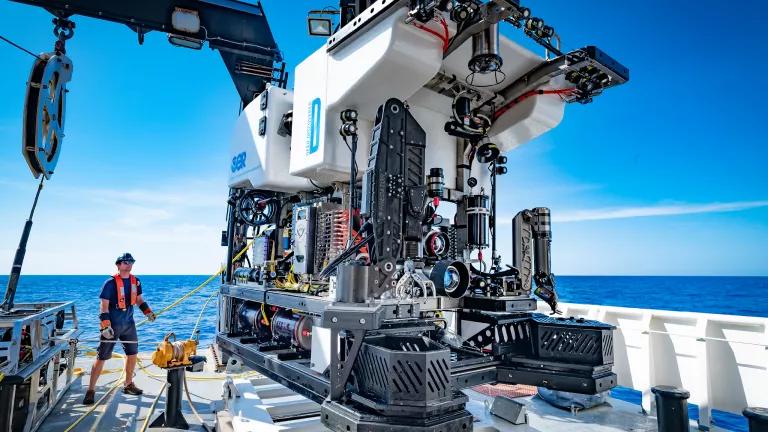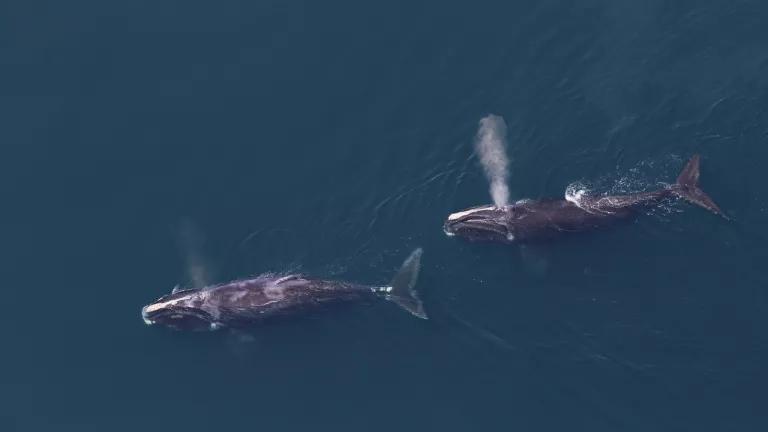Holiday giving started early for our Atlantic Ocean this year with today’s release of two landmark plans designed to keep ocean habitats and wildlife healthy and working for all of us to use and enjoy.
America’s Atlantic is busier than ever before with massive new ships on the way as a result of the Panama Canal expansion, soaring demand for offshore sand mining to rebuild beaches, and offshore wind projects coming online. Our ocean is also home to a vast and rich variety of ocean life—from endangered North Atlantic right whales and sea turtles to dolphins and many fish species. Coordination is desperately needed to drive responsible growth of our “blue economy” so that the ocean can support families and businesses for multiple generations.
And yet, for too long oceans have been managed largely on a project-by-project basis, with little interaction among the dozens of state and federal agencies that make decisions about offshore businesses. This type of siloed approach creates confusion—and won’t help us ensure these resources remain healthy and continue to serve as an economic engine for the long haul.
Fact is, oceans contribute hundreds of billions of dollars in goods and services to the country’s GDP and employ millions of people—with ocean related employment growing almost twice as fast as the U.S. economy as a whole. Here in the Mid-Atlantic, our ocean is an economic powerhouse, supporting nearly 700,000 jobs in the region and contributing more than $48 billion to its gross domestic product (GDP). Many of these jobs rely on clean coastal waters and healthy and abundant fish and wildlife.
Planning ahead allows for smarter choices. It helps identify and resolve potential conflicts early. It allows state and federal managers and industry leaders to make better and quicker development decisions.
The Mid-Atlantic states of Delaware, Maryland, New Jersey, New York, Pennsylvania, and Virginia worked together over the past 3 years with regional fisheries managers, tribes, and federal agencies—and extensive stakeholder and public input—to develop this final Mid-Atlantic Regional Ocean Action Plan to help fix the problems caused by an increasingly crowded and complex ocean. A parallel process has taken place in the Northeast to develop the Northeast Ocean Plan, which similarly embodies commitment from the states of Connecticut, Maine, Massachusetts, New Hampshire, Rhode Island, and Vermont and federal agencies to smarter management of its offshore Atlantic waters.
The Mid-Atlantic and Northeast’s plans are sensible guides for better ocean health and smart development, grounded in what the states want to see. The plans:
- Set out best practices for coordination between state and federal agencies so that we can get ahead of issues before they become problems.
- Include actions that will help us figure out together where new business development makes sense, and where we should conserve important wildlife and habitat spaces that keep our ocean healthy and drive other uses industries like fishing and recreation.
Already one strong improvement in ocean management—for both Northeast and Mid-Atlantic states—has resulted just from the plans’ development. In creating plans that took into account the best available science, both regions developed a massive amount of new information on ocean habitats, wildlife, and how we’re using the ocean; this data is now centralized on two regional easy-to-use websites. Having a library of state, federal, and ocean data in one place on everything from fishing to recreational use, shipping lanes to habitat and wildlife allows for a shared starting point for discussions about projects and can help us make better decisions. The new regional plans commit agencies to using this data to inform and guide ocean decisions.
Today’s news is important not only because we now have a proactive roadmap to maximize benefits and minimize harm for our valuable ocean from Maine to Virginia, but because it heralds a new way of making ocean decisions—one that supports upfront collaboration and open, transparent dialogue and planning among those who manage competing uses in the ocean and where stakeholders and the public have a seat at the decision-making table. NRDC looks forward to helping implement these plans for our ocean’s future.




